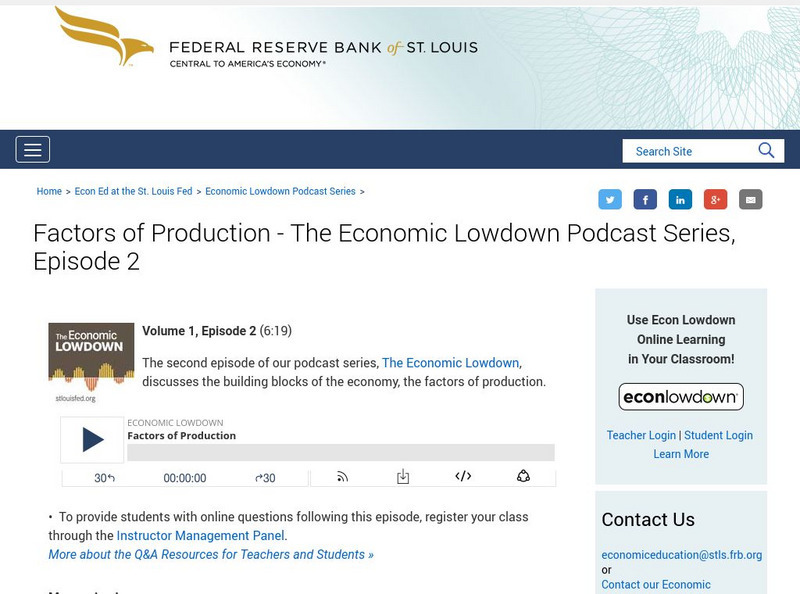Federal Reserve Bank
St. Louis Fed: Opportunity Cost: The Economic Lowdown Podcast Series, Episode 1
Economic Lowdown Podcast [5:42] introduces lessons on three fundamental economic concepts including choice, scarcity and opportunity cost.
Federal Reserve Bank
St. Louis Fed: Factors of Production: Economic Lowdown Podcast Series, Episode 2
Volume 1, Episode 2 of [6 min. 19 sec.] Economic Lowdown discusses factors of production as building blocks to the economy.
The Economics of Seinfeld
Yada Econ: The Economics of Seinfeld: The Big Salad
Economics lesson for middle to high school and beyond is fun when students learn by watching this video clip [2:43] of Seinfeld from season 6, in which George teaches us about the concepts of utility and altruism.
The Economics of Seinfeld
The Economics of Seinfeld: The Chinese Restaurant
Video clip [4:12] from Seinfeld season 2 in which Elaine wonders why restauarant seating isn't allocated based on "level of hunger" demonstrating with humor the economic terms of efficiency and rationing mechanisms.
The Economics of Seinfeld
The Economics of Seinfeld: The Deal
Very funny Seinfeld episode clip [2:52] from which students learn from Elaine, Jerry and Kramer about the fundamental economic concepts of signaling, utility and deadweight loss of gift giving.
Khan Academy
Khan Academy: Credit Default Swaps (Cds) Intro
Introduction to credit default swaps and why they can be dangerous.
Khan Academy
Khan Academy: Financial Weapons of Mass Destruction
Discover why Warren Buffett called Credit Default Swaps financial weapons of mass destruction. [4:48]
Khan Academy
Khan Academy: Credit Default Swaps: Credit Default Swaps 2
Video lecture explains systemic risks of credit default swaps and financial weapons of mass destruction. [12:04]
Khan Academy
Khan Academy: Why Parties in a Cartel Will Cheat: Game Theory of Cheating Firms
A video lecture discussing whether at pareto optimum there is a nash equilibrium when two companies own a duopoly that they run like a monopoly. [9:19]
Khan Academy
Khan Academy: Credit Default Swaps: Credit Default Swaps
An introduction to how credit default swaps work.
Khan Academy
Khan Academy: Nash Equilibrium: More on Nash Equilibrium
Looking more closely at the definition of Nash Equilibrium with more examples. This video lecture will help you understand how to identify situations that are in Nash Equilibrium. [6:30]
Vulcan Productions and Cinelan
We the Economy: A Bee's Invoice: The Hidden Value in Nature
Are natural resources vital to the economy? Why should nature be taken into account when looking at the economy as a whole? "A Bee's Invoice" uncovers and incorporates the hidden value of natural capital in the measurement of our economy.
Vulcan Productions and Cinelan
We the Economy: Monkey Business a.k.a. Economic Inequality
In Monkey Business, filmmaker Shola Lynch chats with economists from across the political spectrum to help explain the causes of economic inequality, with help from a couple of mammalian friends.
Khan Academy
Khan Academy: The Housing Price Conundrum
Why did housing prices go up so much from 2000-2006 even though classical supply/demand would not have called for it.
Khan Academy
Khan Academy: How Can Parents Talk to Their Kids About the Economy?
Sal Khan shares basic talking points to help kids understand the way money and taxes influence the world around them. [1:39]
Khan Academy
Khan Academy: Financial Weapons of Mass Destruction
This video explains why Warren Buffett called Credit Default Swaps financial weapons of mass destruction. [4:47]
Khan Academy
Khan Academy: Economic Models
Economic models are a way of taking complicated ideas and events and breaking them down into their most important characteristics. In this video, learn more about the role that models play in economics, and the importance of the...
















